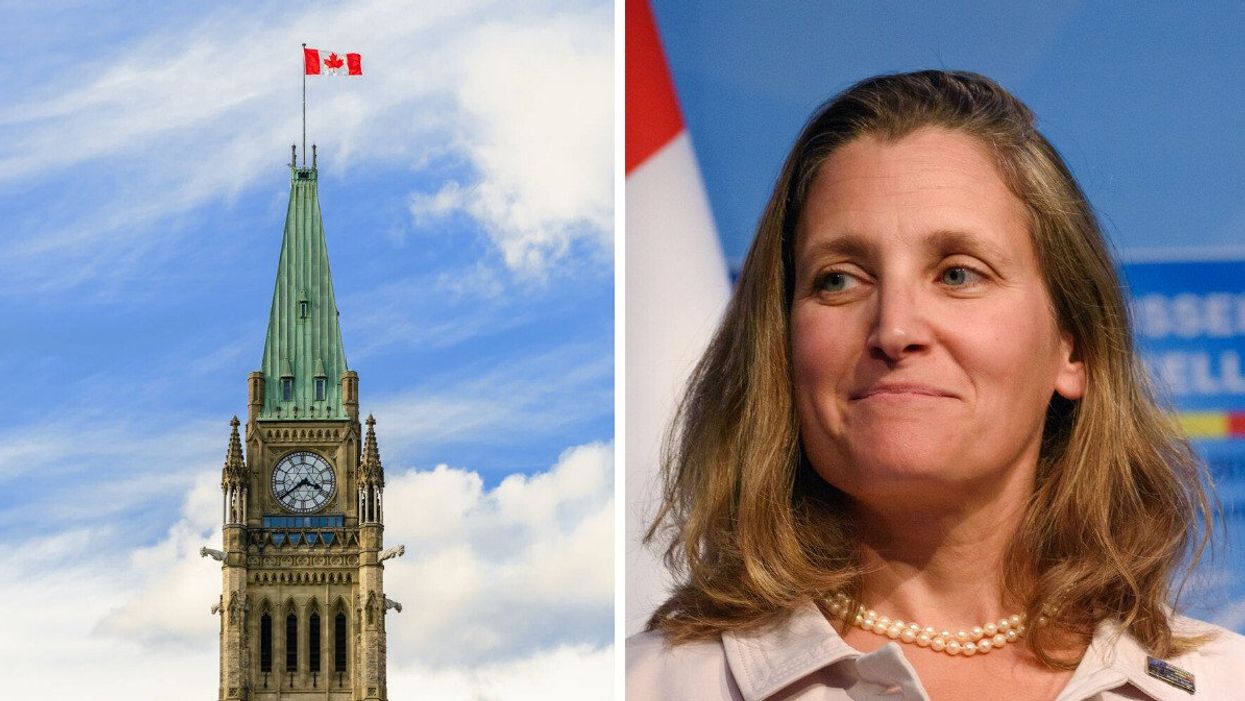Canada Officially Announced A New Grocery Rebate & Millions Would Qualify For The Extra Money
Here's how much eligible Canadians could receive.

Peace Tower of the Centre Block in Ottawa, Ontario. Right: Canada Minister of Finance Chrystia Freeland.
The Canadian federal government's 2023 budget includes a one-time boost to the Goods and Services Tax Credit (GST Credit or GSTC) that it's terming the "Grocery Rebate." This rebate would provide a maximum of $153 per adult, plus $81 per child and $81 for single adults without children, adding up to a maximum of $234 per qualifying Canadian adult living alone.
The new Grocery Rebate is intended to "help make up for higher prices at the checkout counter — without adding fuel to the fire of inflation," according to Finance Minister Chrystia Freeland.
The government expects 11 million Canadians and families would qualify. The measure would cost the government $2.5 billion.
The Grocery Rebate would be paid "as soon as possible following the passage of legislation," and would be granted based on the GSTC system, according to the federal government's budget document.
The rebate would represent double what a GSTC-eligible resident received in their January 2023 payment, up to that maximum of $234 for single people with no children, $467 for couples with two children and $225 for seniors on average.
To receive the maximum GSTC in the 2022-2023 payment period, Canadians must have made under $39,826 in 2021. For each portion of 2021 income that falls above that cut-off, the amount is reduced by five percent.
The 2023 federal budget otherwise includes an investment of $49.5 million over five years in Public Safety Canada, as well as $25.4 million over five years to "support Canada's Anti-Racism Strategy." Another $25 million is promised for 2024 to 2025 to fund the Supporting Black Canadian Communities Initiative, with the goal of "empowering Black-led and Black-serving community organizations and the work they do to promote inclusiveness."
On top of the nearly $50 million for the Communities at Risk: Security Infrastructure Program by Public Safety Canada, the government plans to spend an additional $48.9 million over three years directly on the RCMP.
These numbers pale in comparison to the amount slated for maintaining and supporting Canada's official languages within the next five years. The budget dedicates just under $374 million over five years to new initiatives under the Action Plan for Official Languages. Nearly $680 million over five years is set to fund "high-quality minority-language education, opportunities for second-language learning, and bilingual government services."
This article's cover image was used for illustrative purposes only.
- Here's How Canada's GST Credit Works & When To Expect Your Money ›
- 4 Benefits & Tax Credits That Could Get You Some Extra $$$ In 2023 ›
- A New 'Grocery Rebate' Of Up To $234 Will Reportedly Go Out To Millions Of Canadians ›
- Tax-Free First-Home Savings Accounts Are Officially Launching In Canada — Here's How They Work - MTL Blog ›
- Canada Wants A Single Charger Type For Most Electronics— No More New-Phone-New-Charger B.S. - MTL Blog ›
- We Compared Grocery Prices At IGA, Maxi, Metro, Provigo & Super C — There Was A Clear Winner - MTL Blog ›
- What's The Deal With Canada's New Grocery Rebate? 4 Key Questions Answered Fast - MTL Blog ›
- Canada Announced A New Public Dental Care Plan — Here's Who Would Qualify - MTL Blog ›
- This Hidden Montreal Grocery Store Has Sweet Deals, Costco-Like Sizes & A Huge Cheese Section - MTL Blog ›
